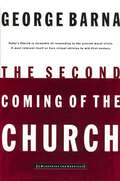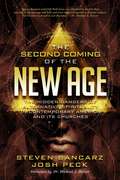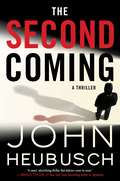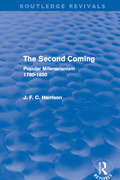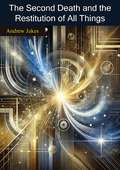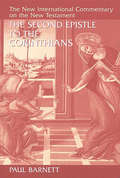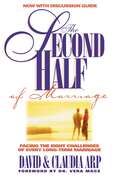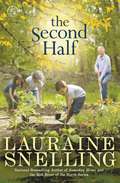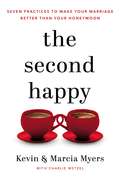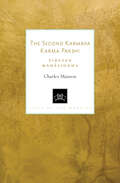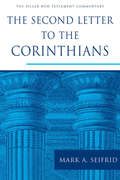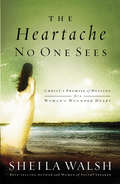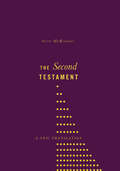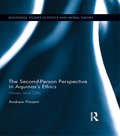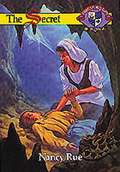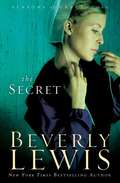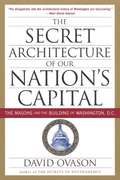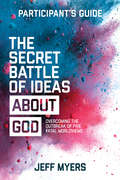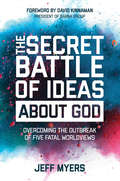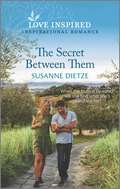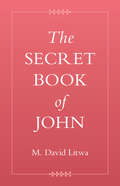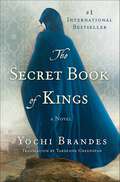- Table View
- List View
The Second Coming of the Church
by George BarnaIn this "blueprint for survival," Christian sociologist George Barna evaluates the moral and spiritual decline of society and the corresponding stagnation within the Church. Using hard data, Barna unveils the status quo and argues convincingly that the Church must re-invent itself or face virtual oblivion by the mid-21st century.
The Second Coming of the New Age: The Hidden Dangers of Alternative Spirituality in Contemporary America and its Churches
by Steven Bancarz Josh PeckAll across North America, Christian churches have unknowingly encouraged occult beliefs and practices far removed from what the Bible teaches. This unfortunate reality is intrinsically linked to the popularity increase of New Age spirituality in the twenty-first century, and we've been so influenced by its integration into our society that we have become blind to recognizing, and preventing, the effects of this mainstream, pop-culture heresy, even within the walls of God's house. In this imperative and timely book, former New-Agers Josh Peck and Steven Bancarz reveal: * What perverse dealings the authors personally witnessed from their experiences deep within the New Age Movement * Which real and dangerous supernatural force lurks behind the New Age Movement * Facts that reveal how the occult has worked its way into modern, evangelical churches * Connections between New Ageism, fallen angels, extraterrestrials, and the Nephilim * Solid, historical associations between the New Age Movement and Satanism * What false-Christ and false-gospel doctrines are being pushed by New Age teachers * How the central deity of the New Age is a thinly veiled version of Leviathan, the ancient personification of chaos * How quantum physics is being manipulated to promote the New Age agenda * How to reach friends and family lost in the New Age movement * Warning signs and influences of the occult in your life and home, and what to do if you are under spiritual attack Our lives, our relationships, our world, and our churches all depend on our willingness to take action against the deceit of New Age spirituality. The first step toward prevention is knowledge. Now is the time to be informed." This book is both scholarly and personal in which the authors share both their exhaustive knowledge and Christian apologetics with their life' stories hoping to convince their readers of the falseness of the New Age and the legitimacy of the Christian faith. The authors support their arguments with a myriad of the notes throughout the text.
The Second Coming: A Thriller (The Shroud Series #2)
by John HeubuschIn this fast-paced sequel to The Shroud Conspiracy &“that Dan Brown fans will love&” (Library Journal), the child cloned from the blood on the Shroud of Turin has the potential to change the world—or to destroy it for good. &“John Heubusch is brilliant. I would read anything he writes&” (Peggy Noonan, Pulitzer Prize-winning columnist and bestselling author). In this &“sensational sequel&” (Steve Forbes), a fallen angel is mistakenly resurrected from the blood of an evil &“Watcher&” taken from the Shroud of Turin, and the fiend bestows an unstoppable plague on the world. Dr. Jon Bondurant, the forensic anthropologist and avowed atheist, joins with devout Domenika Josef to bring another child of the Shroud into the world to save it, this one borne of DNA believed to be that of Jesus Christ. Can this child be the answer to their—and mankind&’s—prayers? His parents are uncertain just who the child is or what he will become, but when he starts demonstrating remarkable powers to heal, they begin to understand that whatever he is, he is not of this world. Might he bring miracles to the world when it needs them the most? Or has science given mankind a tool with which it will destroy itself as the tempting power of the Watcher unfolds? What follows is a globe-spanning chase to uncover the truth and stop a pandemic that just may wipe out humanity once and for all in a &“smart, electrifying thriller that delivers cover-to-cover&” (Brad Thor, #1 New York Times bestselling author of Spymaster).
The Second Coming: Popular Millenarianism, 1780-1850 (Routledge Revivals)
by J. F. HarrisonFirst published in 1979, The Second Coming is an experiment in the writing of popular history – a contribution to the history of the people who have no history and an exploration of some of the ideas, beliefs and ways of thinking of ordinary men and women in the late eighteenth and first half of the nineteenth centuries. Millenarianism is a conceptual tool with which to explore some aspects of popular thought and culture. It is also seen as an ideology of social change and as a continuing tradition, traced from the end of the seventeenth century to the 1790s, and is shown to be embedded in folk culture. Abundant in rich and lively descriptions of such colourful characters as Richard Brothers, Joanna Southcott, John Wroe, Zion Ward and Sir William Courtenay, as well as studies of the Shakers, early Mormons and Millerites, the result is a window into the world of ordinary people in the Age of Romanticism.
The Second Death and the Restitution of All Things: the Life of Christ and our Universalist Destiny
by Andrew JukesThe Second Death and the Restitution of All Things by Andrew Jukes is a thought-provoking theological work that delves into the profound mysteries of eschatology, exploring the concepts of final judgment, the second death, and the ultimate restoration of all creation. With his characteristic depth and clarity, Jukes offers readers a compelling vision of God's redemptive plan for humanity and the universe.In this seminal book, Jukes examines the biblical teachings on the second death and the restitution of all things, drawing on scriptural passages from both the Old and New Testaments. He challenges traditional interpretations of eternal punishment and proposes a more hopeful and restorative understanding of God's justice and mercy. Through rigorous exegesis and theological reflection, Jukes argues for a view of the second death as a purifying process rather than a final, irrevocable condemnation.Jukes' exploration of the restitution of all things highlights the ultimate reconciliation and renewal of creation, as envisioned in the Bible. He paints a vivid picture of a future where God's love and grace triumph over sin and death, bringing about the restoration of all beings to their intended state of harmony and communion with the Creator. This vision offers a message of hope and assurance, emphasizing the boundless nature of God's redemptive purposes.The Second Death and the Restitution of All Things is an essential read for theologians, pastors, and laypersons interested in eschatology, soteriology, and the broader implications of God's plan for salvation. Jukes' profound insights and eloquent prose provide a fresh and inspiring perspective on the ultimate destiny of humanity and the cosmos.This book invites readers to reconsider conventional views on judgment and redemption, encouraging a deeper understanding of God's infinite love and the transformative power of divine justice. Andrew Jukes' work remains a significant contribution to Christian theology, offering a vision of hope that continues to resonate with believers seeking a more comprehensive and compassionate understanding of God's purposes.
The Second Epistle to the Corinthians (The New International Commentary on the New Testament)
by Paul BarnettThis statement reflects the underlying purpose of The New International Commentary on the New Testament. Begun in the late 1940s by an international team of New Testament scholars, the NICNT series has become recognized by pastors, students, and scholars alike as a critical yet orthodox commentary marked by solid biblical scholarship within the evangelical Protestant tradition. While based on a thorough study of the Greek text, the commentary introductions and expositions contain a minimum of Greek references. The NICNT authors evaluate significant textual problems and take into account the most important exegetical literature. More technical aspects — such as grammatical, textual, and historical problems — are dealt with in footnotes, special notes, and appendixes. Under the general editorship of three outstanding New Testament scholars — first Ned Stonehouse (Westminster Theological Seminary, Philadelphia), then F. F. Bruce (University of Manchester, England), and now Gordon D. Fee (Regent College, Vancouver, British Columbia) — the NICNT series has continued to develop over the years. In order to keep the commentary “new” and conversant with contemporary scholarship, the NICNT volumes have been — and will be — revised or replaced as necessary. The newer NICNT volumes in particular take into account the role of recent rhetorical and sociological inquiry in elucidating the meaning of the text, and they also exhibit concern for the theology and application of the text. As the NICNT series is ever brought up to date, it will continue to find ongoing usefulness as an established guide to the New Testament text.
The Second Formation of Islamic Law
by Guy BurakThe Second Formation of Islamic Law is the first book to deal with the rise of an official school of law in the post-Mongol period. The author explores how the Ottoman dynasty shaped the structure and doctrine of a particular branch within the Hanafi school of law. In addition, the book examines the opposition of various jurists, mostly from the empire's Arab provinces, to this development. By looking at the emergence of the concept of an official school of law, the book seeks to call into question the grand narratives of Islamic legal history that tend to see the nineteenth century as the major rupture. Instead, an argument is formed that some of the supposedly nineteenth-century developments, such as the codification of Islamic law, are rooted in much earlier centuries. In so doing, the book offers a new periodization of Islamic legal history in the eastern Islamic lands.
The Second Half of Marriage: Facing the Eight Challenges of the Empty-Nest Years (Second Half of Marriage)
by David ArpYour children are gone or leaving soon. It's time to focus once again on your own future and especially on your marriage. What's in store for the second half? David and Claudia Arp provide answers and practical help in this groundbreaking book. Drawing on their national survey of hundreds of "second-half" couples, the Arps reveal eight marital challenges every long-term marriage faces, and they offer strategies and exercises for meeting each of them. The Second Half of Marriage will challenge you to create a vision for the rest of your life together -- and inspire you to make that vision a reality.
The Second Half: A Novel
by Lauraine SnellingBestselling author Lauraine Snelling shares a heartfelt story of a couple who put their plans for a peaceful retirement on hold to assume guardianship of their young grandchildren. Mona and Ken Sorenson are approaching the best years of their lives. Mona's greatest concern is that Ken will learn of the surprise party she's planning for his retirement from his job as Dean of Students at Stone University. They've already been making plans to travel, spend limitless hours in the garden, and Ken is looking forward to working on his woodworking and fishing with his grandchildren. It's what they deserve after years of careful planning. But things begin to unravel when Ken learns that office politics are about to destroy his department. Can he really just leave, abandoning the work he spent a lifetime achieving? Mona is eager to build her event planning business with Ken's help, but rather than supporting her, he expresses concern that the stress of the work will send her back into the depression she struggles with. Then, just days before Ken's last official day of work, their son, a Special Forces officer in the Army, learns he's being immediately deployed on a six-month mission in Pakistan. Since his wife left him, the only people he trusts to care for his two young children are his parents. In an instant, everything Ken and Mona spent their lives planning changes, and they will need to find strength, both physical and mental, to become parents once more. This is not the second half they wanted, and when their son fails to contact them as planned, they struggle to trust that it is God's plan, not theirs, that matters most.
The Second Happy: Seven Practices to Make Your Marriage Better Than Your Honeymoon
by Kevin and MyersWhat is the secret to a healthy, happy, fulfilling marriage?Nearly every marriage starts out happy, and if we're honest, nearly every marriage at some point becomes unhappy. Is there a solution? Can an unhappy marriage really get back to being happy? Can it be truly and authentically happy--even better than it was at first? Kevin and Marcia Myers, married for thirty-seven years through nearly every challenge a couple can face, emphatically say yes. Revealing seven practices that offer help and hope for a happy and enduring marriage, The Second Happy is a captivating, practical resource that provides the tools necessary to tune-up, overhaul, or even rebuild your marriage. Practices to sustain and strengthen marriage include the following:breaking the quit cycle;picking a fair fight so both people win;keeping disagreements from escalating; andremoving pretense from your relationship.Rooted in Scripture and contemporary insights from the Myers' marriage, as well as real stories from other couples, this revelatory book shows how any marriage can regain depth, meaning and, yes, happiness.
The Second Karmapa Karma Pakshi: Tibetan Mahasiddha
by Charles MansonThe life and writings of a Tibetan meditation master who became the Buddhist priest to two Mongol emperors and is recognized as one of the earliest reincarnated lamas in Tibet.Karma Pakshi is considered influential in the development of the reincarnate lama tradition, a system that led to the lineage of the Dalai Lamas. Born in East Tibet in the thirteenth century, Karma Pakshi himself was the first master to be named Karmapa, a lineage that continues to modern times and has millions of admirers worldwide. During his lifetime, Karma Pakshi was widely acknowledged as a mahāsiddha—a great spiritual adept—and was therefore invited to the Mongol court at the apogee of its influence in Asia. He gave spiritual advice and meditation instructions to the emperor Mӧngke Khan, whom he advised to engage in social policies, to release prisoners, and to adopt a vegetarian diet. After Mӧngke&’s death, Karma Pakshi was imprisoned by the successive emperor Kubilai Khan, and much of Karma Pakshi&’s writing was done while he was captive in northeast China. He was eventually released and returned to Tibet, where he commissioned one of the medieval world&’s largest metal statues: a seated Buddha sixty feet high. Centuries later, two Buddhist meditation masters, the First Mingyur Rinpoche and Chӧgyam Trungpa Rinpoche, were inspired by Karma Pakshi to write meditation practices that are profoundly important to contemporary Tibetan Buddhist practitioners: respectively, the Karma Pakshi Guru Yoga and the Sādhana of Mahāmudrā. This first-ever comprehensive biography of Karma Pakshi in English reveals new information about a pivotal historical figure in the development of Tibetan Buddhism and his interactions with two Mongol emperors. Also included are translations of several newly available songs attributed to Karma Pakshi and translations of ten excerpts of his writings on reincarnation, meditation, dreams, visionary experiences, tantra, and consecration. Details on the music of Karma Pakshi's singing of the maṇi mantra are also given.
The Second Letter to the Corinthians (The Pillar New Testament Commentary (PNTC))
by Mark A. SeifridNewest volume in the acclaimed Pillar New Testament Commentary series The question that Paul set before the ancient church in Corinth -- Do you not recognize that Jesus Christ is in and among you? (2 Cor 13:5) -- remains a critical question for the church today. This commentary by Mark Seifrid seeks to hear Paul’s message afresh and communicate it to our time. Seifrid offers a unified reading of 2 Corinthians, which has often been regarded as a composite of excerpts and fragments. He argues that Paul’s message is directed at the “practical atheism” of the Corinthian church -- the hidden heresy that assumes God’s saving work in the world may be measured by outward standards of success and achievement. Like all of the Pillar volumes, Seifrid’s commentary on 2 Corinthians offers careful grammatical analysis and exegesis with clear pastoral application.
The Second Most Important Book You Will Ever Read: A Personal Challenge to Read the Bible
by Dan PatrickSo what's your excuse for failing to read the MOST important book ever written, the Bible? Don't think you can understand the Bible? No time for Bible reading? No relevancy of the Bible to your life? Questions about the Bible's authenticity? Although most Americans own a Bible, polls show that few people have read the Bible or even parts of it. Perhaps what most Americans don't know is that the Bible has life-changing information about how to get right with God know why you are alive today receive God's guidance...daily get through tough times have a successful marriage and family life know what you really believe with confidence manage your money and resources communicate with God build good relationships prepare for the future Dan Patrick's book is for those with little or no faith in God...for those who attend church but haven't read the Bible...and for serious Bible students. Read it, and then give a copy to a friend.
The Second Story Bookshop: A delightful, sweet, second chance romance
by Denise HunterShe inherits the bookshop of her dreams . . . But she has to run it with the ex she vowed never to speak with again. "Book lovers, book clubs, and anyone who's ever dreamed of owning a bookstore will adore this cleverly interwoven story" (Lisa Wingate, #1 New York Times bestselling author of Shelterwood). Full of fall vibes, The Second Story Bookshop is perfect for fans of Debbie Macomber and Gilmore Girls.Shelby Thatcher adores working in the charming small-town bookshop her grandmother opened years ago. Since high school she's helped Gram turn the shop into a community hub for book lovers in the lakeside town of Grandville, NC. When her beloved grandma passes away, Shelby inherits the bookstore. But to her shock, Gram leaves half ownership to Gray Briggs, the man who broke Shelby's heart years ago.Grandville residents have been vilifying Gray as long as he can remember. After graduating high school he couldn't skip town fast enough, even though it meant leaving the girl he'd fallen deeply in love with and alienating her family once and for all. Now he's back, the beneficiary of his elderly friend's will. Facing the town's animosity is difficult, but seeing Shelby again is sheer torture. No one could ever stir his heart the way she did.As the adversaries are forced to work together, Gram's beyond-the-grave scheme is working--Shelby's old feelings for Gray begin to resurface. But the problems that destroyed their relationship before still remain, and a new one surfaces--one that threatens Gram's beloved bookshop. Is their love doomed to fail again, or will they find a way to make it work this time around?If you're looking for an enemies-to-lovers, second-chance romance set in a cozy lakeside bookshop brimming with healing, heart, and Southern charm, The Second Story Bookshop is your perfect, feel-good escape. Let Shelby and Gray's tender journey remind you that sometimes the path back to love starts at the front step of a bookstore.
The Second Testament: A New Translation
by Scot McKnightExperience the New Testament afresh in Scot McKnight's bold translation. Typical translations of the New Testament make the biblical text as accessible as possible by using the language of our own day. At times this masks the distance between the New Testament text and modern readers. Scripture continues to speak to us but it speaks as an ancient text to the modern world. New Testament scholar Scot McKnight offers a translation of the New Testament with a daring approach to the ancient text. Clever in its expression and at times stunning in its boldness, The Second Testament will challenge readers to experience God's Word anew. God blesses the beggars in spirit because theirs is Heavens’ Empire. God blesses the grievers because they will be consoled. God blesses the meek because they will inherit the land. God blesses the ones hungering and thirsting for the rightness because they will be satisfied. (Matthew 5:3-6) Features include: Complete text of the New Testament Brief introductions to each book Maps of key locations and events Glossary of key terms in the translation Full-cloth hardcover with foil stamping
The Second-Person Perspective in Aquinas’s Ethics: Virtues and Gifts (Routledge Studies in Ethics and Moral Theory #17)
by Andrew PinsentThomas Aquinas devoted a substantial proportion of his greatest works to the virtues. Yet, despite the availability of these texts (and centuries of commentary), Aquinas’s virtue ethics remains mysterious, leaving readers with many unanswered questions. In this book, Pinsent argues that the key to understanding Aquinas’s approach is to be found in an association between: a) attributes he appends to the virtues, and b) interpersonal capacities investigated by the science of social cognition, especially in the context of autistic spectrum disorder. The book uses this research to argue that Aquinas’s approach to the virtues is radically non-Aristotelian and founded on the concept of second-person relatedness.To demonstrate the explanatory power of this principle, Pinsent shows how the second-person perspective gives interpretation to Aquinas’s descriptions of the virtues and offers a key to long-standing problems, such as the reconciliation of magnanimity and humility. The principle of second-person relatedness also interprets acts that Aquinas describes as the fruition of the virtues. Pinsent concludes by considering how this approach may shape future developments in virtue ethics.
The Secret
by Nancy RueBook 6 in the Christian Heritage Series, The Salem Years. Hope is sneaking into the forest with someone -- and Josiah knows who it is! If Papa finds out, he'll be furious! Can Josiah keep it a secret?
The Secret (Seasons of Grace #1)
by Beverly LewisIn the seemingly ordinary Amish home of Grace Byler, secrets abound. For instance, why does her mother weep in the night, and why does her father refuse to admit something is dreadfully wrong with his wife and with his marriage? Then, in one startling moment, Grace's mother unexpectedly leaves the family in search of something that will deliver her mother from the deep grief that she feels. With her mother's desertion, everything Grace assumed she knew is shattered. Her mother's disappearance leaves Grace reeling and unable to keep her betrothal promise to her long-time boyfriend. Left to pick up the pieces of her life, Grace questions all she has been taught about love, family, and commitment. Similarly, the other members of the family attempt to deal with their sense of abandonment and their feelings of betrayal. Finally, the larger community also tries to make sense of this irreproachable action. At the same time, Heather Nelson, an non-Amish, graduate student is plagued by a doctor's diagnosis of terminal cancer. In her denial and telling no one she is terminally ill, Heather travels to Lancaster County hoping to find the peace and rest that she desires. Lancaster is the last place she and her now deceased mother had visited together. Will Heather find healing for body and spirit? In this first book of the Season of Grace series, the lives of the wounded characters begin to weave together like an Amish patchwork quilt. They each discover missing pieces of their life puzzles and glimpse the gracious hand of a loving God who moves the characters toward spiritual wholeness. At the end of the novel, many questions are left unanswered leaving the reader ready to read the next novel in the series to finish his or her own patchwork quilt. Through this novel, the reader becomes acquainted with the community, culture, and personal dimensions of Amish life. The non-Amish reader becomes enthralled in the story as he or she travels to a different realm of existence. The reader learns to appreciate this often misunderstood culture.
The Secret Amish Admirer: An Uplifting Inspirational Romance
by Virginia WiseThis could be her one chance To win his heart…For years, Eliza Zook has been content to love Gabriel King from afar. But when an injury forces him off the farm and into the Amish gift shop alongside Eliza, she has no idea how to act around her secret crush. Working side by side, it seems that opposites really do attract…but can the single mother convince the rebel that he&’s worthy of love?From Love Inspired: Uplifting stories of faith, forgiveness and hope.
The Secret Architecture of Our Nation's Capital: The Masons and the Building of Washington, D. C.
by David OvasonToday, there are more than twenty complete zodiacs in Washington, D.C.-- each one pointing to an extraordinary mystery. David Ovason, who has studied these astrological devices for ten years, now reveals why they have been placed in such abundance in the center of our nation's capital and explains their interconnections. His richly illustrated text tells the story of how Washington, from its foundation in 1791, was linked with the zodiac, with the meaning of certain stars, and with a hidden cosmological symbolism that he uncovers here for the first time. Fascinating and thoroughly researched, The Secret Architecture of Our Nation's Capital is an engrossing book that raises provocative questions and offers complex insights into the meanings behind the mysterious symbols in Washington. David Ovason has spent more than a decade researching the architecture and zodiacs of Washington, D.C. He teaches astrology and has studied the life and writings of Nostradamus for more than forty years. He is the author of several books, including The Secrets of Nostradamus and Nostradamus: Prophecies for America. Mr. Ovason lives and works in England.
The Secret Battle of Ideas about God Participant's Guide: Overcoming the Outbreak of Five Fatal Worldviews
by Dr Jeff MyersThis seven-week participant’s guide helps readers dig deeper and strengthen their faith as they learn how ideas from the five fatal worldviews can infect their faith. Readers will understand more about Secularism, Marxism, Islam, New Spirituality, and Postmodernism, and how their faith can be affected by the ideas these worldviews spread. Designed to be used alongside the book and DVD, this interactive guide gives readers tools to establish a strong, biblical worldview.
The Secret Battle of Ideas about God: Overcoming the Outbreak of Five Fatal Worldviews
by Dr Jeff MyersA virus has been spreading across America. Chances are you’ve already been infected without even realizing it. The virus is made up of dangerous ideas—worldviews that don’t reflect Jesus and biblical living. According to a recent Barna study, less than one in five practicing Christians have a biblical worldview. Idea viruses—stemming from secularism, Marxism, postmodernism, new spirituality, and Islam—are rampant in our churches today. But don’t give up—there is hope! The Secret Battle of Ideas about God is a manual for winning the battle of ideas that is raging for our hearts and minds. Join Jeff Myers on a fascinating journey exploring today’s worldviews and what they say about life’s biggest questions. What he discovers will astound you; strengthen your faith; and inspire a newfound sense of love, healing, purpose, peace, and hope in your life.
The Secret Between Them: An Uplifting Inspirational Romance (Widow's Peak Creek #5)
by Susanne DietzeAfter a lifetime of questions, She&’s ready for some answers. In her mother&’s hometown, Harper Price is sure she&’ll finally learn about the grandfather and father she never knew. But that means working with grumpy local lawyer Joel Morgan. The single dad is wary of Harper, even as her kindness to his daughter warms his heart. Winning his trust is Harper&’s first challenge…but not her last as her quest reveals shocking truths.From Love Inspired: Uplifting stories of faith, forgiveness and hope.Widow's Peak Creek Book 1: A Future for His TwinsBook 2: Seeking SanctuaryBook 3: A Small-Town Christmas ChallengeBook 4: A Need to ProtectBook 5: The Secret Between Them
The Secret Book of John (Coptic Gospels and Associated Texts)
by M. David LitwaIn this volume, David Litwa offers a fresh introduction to the 'gnostic Bible,' arguably the most significant and widely read of all gnostic Christian texts ever written. Providing a fresh introduction to a particular version of the Secret Book of John, namely the shorter version that is found in Nag Hammadi Codex III, his study includes a new translation of this text and an extensive commentary in which he introduces the notable features of this codex and interrogates whether the Secret Book emerged from an actual gnostic community. Litwa also posits solutions to many questions related to this text, notably: its date and find spot, its relationship to the treatise known and summarized by Irenaeus in the late second century, its interpretation and re-creation of the book of Genesis for Christian readers, its novel interpretation of Greco-Roman philosophy, its foundations in apostolic authority, and the reception of the Secret Book of John in late antiquity, well into the fifth century CE.
The Secret Book of Kings: A Novel
by Yochi Brandes“This volume, by Biblical scholar Yochi Brandes, is a riveting novel based on textual sources about the experiences of David and Solomon. Its lessons are also relevant for our turbulent time.” —Elie Wiesel, #1 New York Times and internationally bestselling author of NightIn the tradition of The Red Tent from internationally bestselling author Yochi Brandes comes the stories of the struggles of King David and King Saul in the early days of the Kingdom of Israel, seen through the eyes of Michal, Saul’s daughter and David’s abandoned queenStories are deadlier than swords. Swords kill only those who stand before them, stories decide who will live and die in generations to come.Shelomoam, a young man from the tribe of Ephraim, has grown up in the shadow of dark secrets. He wonders why his father is deathly afraid of the King’s soldiers and why his mother has lied about the identities of those closest to him. Shelomoam is determined to unearth his mysterious past, never imagining where his quest will ultimately lead him.The Secret Book of Kings upends conventions of biblical novels, engaging with the canonized stories of the founding of the Kingdom of Israel and turning them on their heads. Presented for the first time are the heretofore unknown stories of the House of Saul and of the northern Kingdom of Israel, stories that were artfully concealed by the House of David and the scribes of the southern Kingdom of Judah.Yochi Brandes, one of Israel’s all-time bestselling novelists, enlists her unique background in both academic Jewish scholarship and traditional religious commentaries to read the Bible in an utterly new way. In this book, a major publishing phenomenon in Israel and one of the bestselling novels in the history of the country, she uncovers vibrant characters, especially women, buried deep within the scriptures, and asks the loaded question: to what extent can we really know our past when history is written by the victors?
